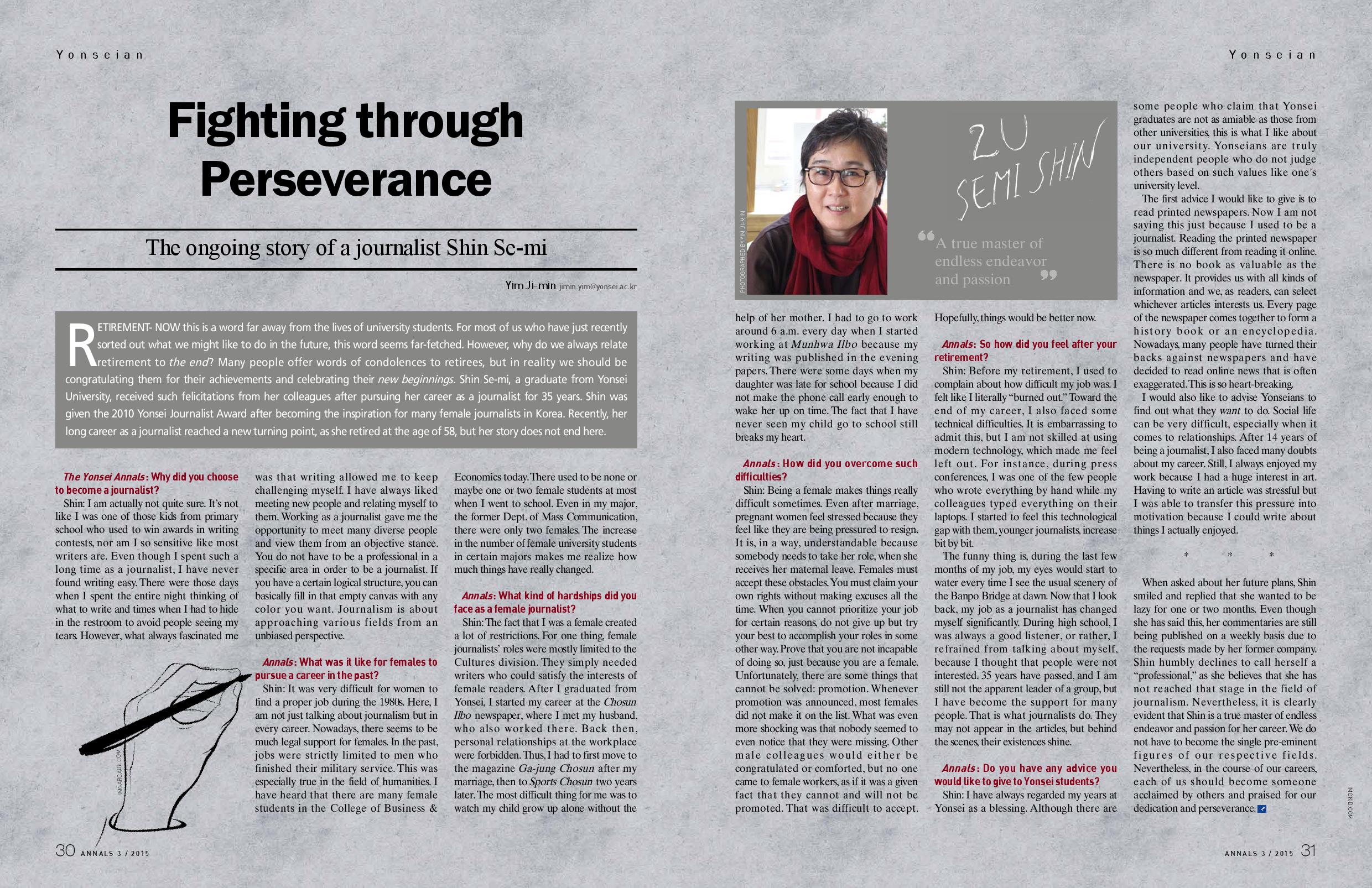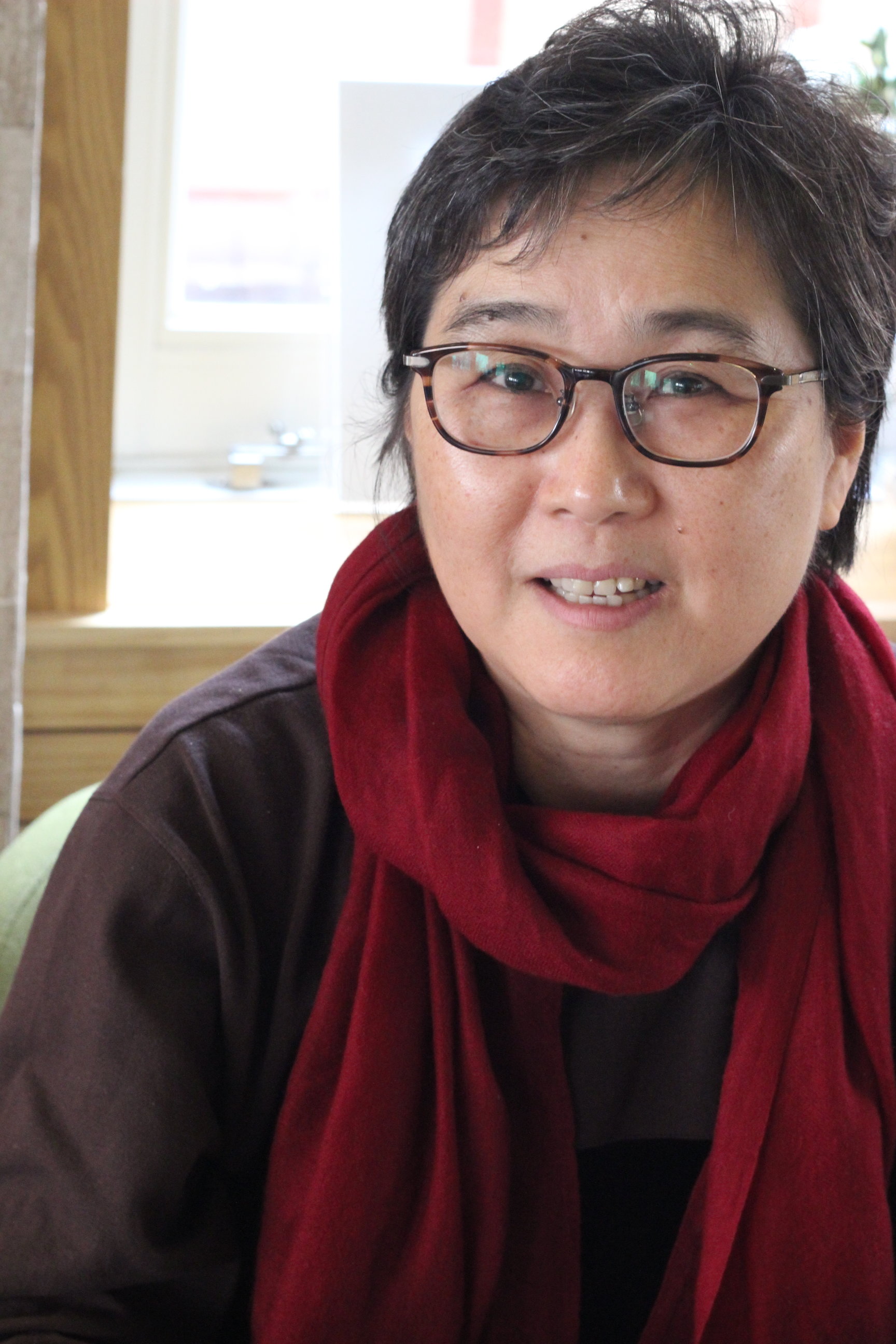RETIREMENT- NOW this is a word far away from the lives of university students.For most of us who have just recently sorted out what we might like to do in the future, this word seems far-fetched. However, why do we always relate retirement to the end? Many people offer words of condolences to retirees, but in reality we should be congratulating them for their achievements and celebrating their new beginnings. Shin Se-mi, a graduate from Yonsei University, received such felicitations from her colleagues after pursuing her career as a journalist for 35 years. Shin was given the 2010 Yonsei Journalist Award after becoming the inspiration for many female journalists in Korea. Recently, her long career as a journalist reached a new turning point, as she retired at the age of 58, but her story does not end here.
The Yonsei Annals: Why did you choose to become a journalist?
Shin: I am actually not quite sure. It’s not like I was one of those kids from primary school who used to win awards in writing contests, nor am I so sensitive like most writers are. Even though I spent such a long time as a journalist, I have never found writing easy. There were those days when I spent the entire night thinking of what to write and times when I had to hide in the restroom to avoid people seeing my tears. However, what always fascinated me was that writing allowed me to keep challenging myself. I have always liked meeting new people and relating myself to them. Working as a journalist gave me the opportunity to meet many diverse people and view them from an objective stance. You do not have to be a professional in aspecificarea in order to be a journalist. If you have a certain logical structure, you can basically fill in that empty canvas with any color you want. Journalism is about approaching various fields from an unbiased perspective.
Annals: What was it like for females to pursue a career in the past?
Shin: It was very difficult for women to find a proper job during the 1980s. Here, I am not just talking about journalism but in every career. Nowadays, there seems to be much legal support for females. In the past, jobs were strictly limited to men who finished their military service. This was especially true in the field of humanities. I have heard that there are many female students in the College of Business & Economics today. There used to be none or maybe one or two femalestudents at most when I went to school. Even in my major, the former Dept. of Mass Communication, there were only two females. The increase in the number of female university students in certain majors makes me realize how much things have really changed.
Annals: What kind of hardships did you face as a female journalist?
Shin: The fact that I was a female created a lot of restrictions. For one thing, female journalists’ roles were mostly limited to the Cultures division. They simply needed writers who could satisfy the interests of female readers. After I graduated from Yonsei, I started my career at the Chosun Ilbo newspaper, where I met my husband, who also worked there. Back then, personal relationships at the workplace were forbidden. Thus, I had to first move to the magazine Ga-jung Chosun after my marriage, then to Sports Chosun two years later. The most difficult thing for me was to watch my child grow up alone without the help of her mother. I had to go to work around 6 a.m. every day when I started working at Munhwa Ilbo because my writing was published in the evening papers. There were some days when my daughter was late for school because I did not make the phone call early enough to wake her up on time. The fact that I have never seen my child go to school still breaks my heart.
Annals: How did you overcome such difficulties?
Shin: Being a female makes things really difficult sometimes. Even after marriage, pregnant women feel stressed because they feel like they are being pressured to resign. It is, in a way, understandable because somebody needs to take her role, when she receives her maternal leave. Females must accept these obstacles. You must claim your own rights without making excuses all the time. When you cannot prioritize your job for certain reasons, do not give up but try your best to accomplish your roles in some other way. Prove that you are not incapable of doing so, just because you are a female. Unfortunately, there are some things that cannot be solved: promotion. Whenever promotion was announced, most females did not make it on the list. What was even more shocking was that nobody seemed to even notice that they were missing. Other male colleagues would either be congratulated or comforted, but no one came to female workers, as if it was a given fact that they cannot and will not be promoted. That was difficult to accept. Hopefully, things would be better now.
Annals: So how did you feel after your retirement?
Shin: Before my retirement, I used to complain about how difficult my job was. I felt like I literally “burned out.” Towardthe end of my career, I also faced some technical difficulties. It is embarrassing to admit this, but I am not skilled at using modern technology, which made me feel left out. For instance, during press conferences, I was one of the few people who wrote everything by hand while my colleagues typed everything on their laptops. I started to feel this technological gap with them, younger journalists, increase bit by bit.
The funny thing is, during the last few months of my job, my eyes would start to water every time I see the usual scenery of the Banpo Bridge at dawn. Now that I look back, my job as a journalist has changed myself significantly. During high school, I was always a good listener, or rather, I refrained from talking about myself, because I thought that people were not interested. 35 years have passed, and I am still not the apparent leader of a group, but I have become the support for many people. That is what journalists do. They may not appear in the articles, but behind the scenes, their existences shine.
Annals: Do you have any advice you would like to give to Yonsei students?
Shin: I have always regarded my years at Yonsei as a blessing. Although there are some people who claim that Yonsei graduatesare not as amiable as those from other universities, this is what I like about our university. Yonseians are truly independent people who do not judge others based on such values like one's university level.
The first advice I would like to give is to read printed newspapers. Now I am not saying this just because I used to be a journalist. Reading the printed newspaper is so much different from reading it online. There is no book as valuable as the newspaper. It provides us with all kinds of information and we, as readers, can select whichever articles interests us. Every page of the newspaper comes together to form a history book or an encyclopedia. Nowadays, many people have turned their backs against newspapers and have decided to read online news that is often exaggerated. This is so heart-breaking.
I would also like to advise Yonseians to find out what they want to do. Social life can be very difficult, especially when it comes to relationships. After 14 years of being a journalist, I also faced many doubts about my career. Still, I always enjoyed my work because I had a huge interest in art. Having to write an article was stressful but I was able to transfer this pressure into motivation because I could write about things I actually enjoyed.
* * *
When asked about her future plans, Shin smiled and replied that she wanted to be lazy for one or two months. Even though she has said this, her commentaries are still being published on a weekly basis due to the requests made by her former company. Shin humbly declines to call herself a “professional,” as she believes that she has not reached that stage in the field of journalism. Nevertheless, it is clearly evident that Shin is a true master of endless endeavor and passion for her career. We do not have to become the single pre-eminent figures of our respectivefields. Nevertheless, in the course of our careers,each of usshould become someone acclaimed by others and praised for our dedication and perseverance.



